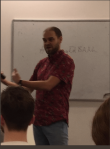On the 18th and 19th January 2018, the University of Glasgow hosted a two day research symposium ‘Cognitive Approaches to Language in Education’ which was part of the BAAL/Routledge research seminar series. The purpose of the workshop was for both established academics, postgraduate students and early career researchers to come together to explore what recent research in the field of cognitive linguistics could potentially offer both language and content teachers, in terms of developing their students’ conceptual understanding within their subject area, and discipline specific language and literacy skills. The sessions allowed for participants to consider how the principles of cognitive linguistics could be best applied in teaching by sharing and demonstrating new methods and techniques, as well as investigate the evidence that applying these principles could be beneficial to the learner.
During the first session ‘methodological challenges’ run by Sally Zacharias on the Thursday the participants were given the opportunity to examine some of the obstacles they’d encountered in carrying out research in the field of cognitive linguistics in educational settings, and consider together (over a bit of coffee and cake!) how these obstacles may be overcome.
On the Friday, there were four keynote presentations and six shorter presentations given by postgraduate students and early career researchers. In ‘Maps and apps: metaphor in the classroom’, Dr Wendy Anderson (University of Glasgow) demonstrated some of the excellent educational resources the research team had designed as part of the ‘Metaphor in the Curriculum’ project to help develop English secondary pupils’ understanding of metaphors in Scottish schools. Then Ian Cushing (UCL/Aston University) in ‘Teacher discourse about grammar: what metaphors reveal’ gave a fascinating talk about how teachers construe grammar, both positively and negatively through metaphors in their professional practice. This was followed by Lucy Taylor (University of Leeds), who presented her detailed exploration of primary pupils’ writing through a cognitive discursive (Text World Theory) lens.
In the second keynote ‘Metaphor and climate science in UK secondary school discourse’ Prof Alice Deignan (University of Leeds) and Prof Elena Semino (Lancaster University) reported on the findings of an AHRC project which investigated the differences in use of metaphors to describe the greenhouse effect by secondary science pupils, science textbooks and scientific articles. Drawing from a cognitive perspective, reasons for these differences were made, that were shown to have very clear implications for the classroom. After lunch, Dr Marcello Giovanelli (Aston University) and Dr Jessica Mason (Sheffield Hallam University) gave the third keynote with ‘Studying Fiction: emphasis, attention and cognition in the classroom’. They drew from cognitive linguistic and stylistic frameworks to critically examine how teachers highlight and prime various aspects of the literature classroom experience at the expense of others, that might be very different to the reading experience that pupils have outside the classroom. In the following talk ‘Cognitive grammar and mind attribution in the language and literature classroom’ Dr Louise Nuttall (University of Huddersfield) explored and demonstrated, through practical examples, how pairing both mind attribution and principles of cognitive grammar could be successfully used in the classroom to explain empathetic and ethical responses to the people and situations represented in texts.
Following on from this, Natalie Finlayson (University of Glasgow) drew on prototype theory to examine L2 vocabulary acquisition, concluding that the phrase, “because that’s just the way it is!” that teachers often use when referring to the literal translations their language learners try to make from their own language, could be replaced with a more motivated explanation based on prototype theory. Dr Dina Awad and Isra Richards (Leicester University) concluded the session before the tea break with ‘A map of cognitive development.’ Their talk described the results of a study exploring the relationship between the cognitive processes e.g. mental shifts, and second language learning, amongst a group of international pre-sessional students.
The final session of the day started with Prof Jeanette Littlemore’s fascinating keynote presentation on the ‘Maths, Metaphor and Music’ project she and other researchers* are working on at University of Birmingham. Illustrating with video clips from classrooms, Jeannette showed how primary metaphors are prevalent in both mathematical and musical thinking and learning. Finally, Dr Rawan Saaty (King Abdul-Aziz University, Saudi Arabia), presented her findings of her doctoral research, which concluded that students exposed to embodied metaphor training were more likely to retain taught metaphoric expressions.
As well as a stimulating day of presentations and discussions, the event offered the participants time to network during the breaks and later out in local pubs and restaurants. As one participant noted – It was a really great event – I’ve come away with lots of project ideas and renewed motivation. In terms both of range and quality of talks and of organisation, it was one of the best workshops I’ve attended in quite some time.
Organisers: Sally Zacharias, Dr Marcello Giovanelli and Dr Agnes Marszalek
*Samantha Ford and Greg Woodin are part of the Maths, Metaphor and Music research team. Samantha Ford’s blog post of the Baal/Routledge event can be found here.
Abstracts of talks can be found here.
by Sally Zacharias







